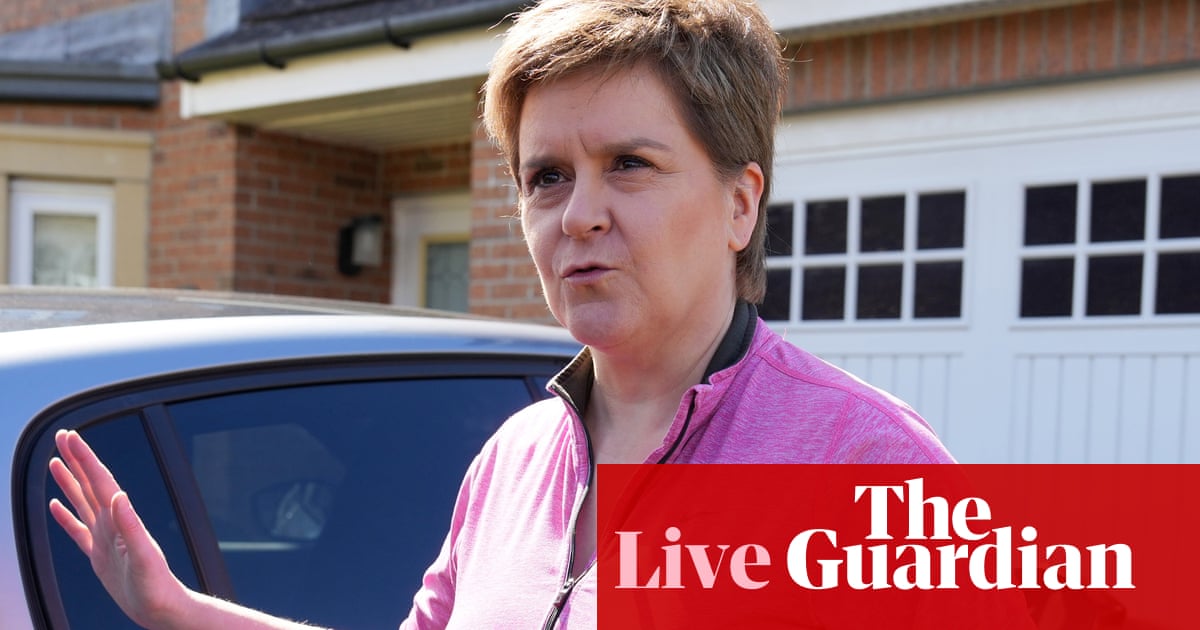
Early evening summary
A landmark report on racial disparity has criticised the use of the term “institutional racism” and claimed other factors, such as family or class, have more “significant impact” on life chances than racism. The report from Commission on Race and Ethnic Disparities, which was set up by Boris Johnson last year in response to the Black Lives Matter protests (see 8.42am), seems intended to reset the national debate on race, minimising the significance of systemic or structural racism. But commission members have not been fully clear on exactly what they are saying on this topic (see 5.42pm) and opposition parties, trade unions, race experts and equality campaigners have widely dismissed report’s analysis as shallow, naive or politically motivated. Labour said it was an “insult” because it ignored the racial factors in deaths from Covid. (See 4.04pm.) And it has emerged that a “considerable number” of the people who responded to the call for evidence by the commission did tell it they thought Britain was structurally or systemically racist. (See 3.14pm.) My colleagues Peter Walker and Nazia Parveen summarise what the report says, and the response of critics, here.
The official policing inspectorate showed repeated bias in favour of the police and against peaceful protesters as it compiled a report which backed a government clampdown, a whistleblower has alleged.
Inspectors from Ofsted are to investigate how private and state schools in England are handling sexual harassment and assault among their pupils, the government has announced.
Labour has renewed calls for the Cabinet Office to investigate David Cameron’s connections with Greensill Capital and how the collapsed finance firm’s Australian founder was welcomed into the heart of government.
Lisa Nandy, the shadow foreign secretary, has said “national security” would be the first foreign policy priority of a Labour government. In a speech she said:
First and foremost the next Labour government will make national security our top priority. To defend the British people from new and traditional threats we will protect our armed forces, take action to defend our democracy and work with partners across Nato and the EU to deal with Russian aggression. The defence and security of the British people is written into the Labour party’s constitution and it is part of our DNA.
That’s all from me for today. But coverage continues on our global coronavirus live blog. It’s here.
In an interview for ITV’s Peston, Rishi Sunak, the chancellor, said that although racism still existed in the UK, a lot of progress had been made. He said:
That’s not to say there aren’t instances of racism that of course exist in this country.
But if I think about the things that happened to me when I was a kid, I can’t imagine those things happening to me now.
And I think that’s a sign of the progress we’ve made as a country.
The race commission report argues that data on the use of stop and search by police is misunderstood. As with some of its findings on Covid (see 4.51pm), this is another example of how it plays down the racial element in data that would be interpreted by others as evidence of systematic or structural racism.
The report says:
It is sometimes claimed that black people are nine times more likely than white people to be stopped and searched.
This relative rate is reported at a national level and does not account for differences in the sizes or characteristics of local populations or the way stop and search is used at a local level.
For these reasons, the national relative rate is not always accurate and stop and search rates should be analysed at smaller geographic levels.
Others would argue that, if stop and search is being used disproportionately in areas where black people live, then that itself is evidence of a problem.
Race commission not saying there"s no institutional racism in UK, says member - after chairman implied the opposite
This morning Tony Sewell, the chair of the Commission on Race and Ethnic Disparities, told the Today programme that the commission had not found evidence that institutional racism existed in the UK. (See 8.42am.) This backed up the passage in the press release from the Government Equalities Office released overnight saying the report would suggest the “well-meaning ‘idealism’ of many young people who claim the country is still institutionally racist is not borne out by the evidence”.
But on Radio 4’s PM programme Evan Davis has just interviewed Samir Shah, a TV executive and a member of the commission, and he asked Shah if he thought there was no institutional racism in the UK. Shah replied:
No, that’s not the view of me or the commission.
The report itself does argue that the term institutional racism is used too widely. It says:
We have argued for the use of the term ‘institutional racism’ to be applied only when deep-seated racism can be proven on a systemic level and not be used as a general catch-all phrase for any micro-aggression, witting or unwitting.
It also says people should distinguish between institutional racism, which it defines as “applicable to an institution that is racist or discriminatory processes, policies, attitudes or behaviours in a single institution”; systemic racism, which it defines as something that “applies to interconnected organisations, or wider society, which exhibit racist or discriminatory processes, policies, attitudes or behaviours”; and structural racism, which it defines as a term “to describe a legacy of historic racist or discriminatory processes, policies, attitudes or behaviours that continue to shape organisations and societies today”.
But generally the report does not go on to explain which of these terms the commission thinks do and do not apply in Britain. Broadly, it does not identify them as problems, preferring to focus on other explanations for disadvantage. (See 12.39pm.) But it does not say (as implied by the government briefing) that they don’t exist either.
From my colleague Peter Walker
The Green party has pledged a “revolution from the bottom up” through a green recovery plan as it launched its local election campaign, PA Media reports. PA says:
Speaking at the socially-distanced launch in London’s Battersea Park, co-leader Jonathan Bartley said voters should see the Green party as “the obvious choice” in the current climate.
The party is proposing a transformation of the agriculture industry, use of sustainable materials for sustainable homes and an improved transport network to distribute energy from offshore renewables more efficiently, in a move it says will “share the prosperity around”.
Bartley said he believed there could be some “real breakthroughs” for the party on 6 May as it looks to build support in areas such as Sheffield, Burnley and Bristol.
The TUC has accused the Commission on Race and Ethnic Disparities of seeking to “deny the experiences of black and minority ethnic workers”. In a statement, its general secretary, Frances O’Grady, said:
Black and minority ethnic workers are far more likely than white workers to be in low-paid, insecure jobs – such as temporary and agency jobs or zero hours contracts. And black and minority ethnic workers have been far more likely to be exposed to Covid infection and far more likely to die – because they are far more likely to be in frontline roles.
This is institutional racism. And it traps too many black and minority ethnic workers in poverty, insecurity and low pay.
The SNP has said the race commission’s report fails to grasp the scale of the problem. The party has issued this statement, from Kaukab Stewart, its candidate for Glasgow Kelvin in the Scottish parliament election. She said:
It’s evident that the review fails to properly grasp the scale of the issue and concerns raised, and there are questions over the cynical manner in which this review was trailed before its full publication.
We all need to have an open and honest conversation on race and the systematic and structural issues that perpetuate inequality. Only by acknowledging and understanding institutional racism will we be able to effectively tackle it in all aspects of life.
Labour says the report from the Commission on Race and Ethnic Disparities downplays the role of institutional or systemic racism in the pandemic. (See 4.04pm.) For reference, here is a passage addressing this from the report.
Another example of overly pessimistic narratives, heightened by the Covid-19 pandemic, has been on race and health. The increased age-adjusted risk of death from Covid-19 in Black and South Asian groups has widely been reported as being due to racism – and as exacerbating existing health inequalities.
However many analyses have shown that the increased risk of dying from Covid-19 is mainly due to an increased risk of exposure to infection. This is attributed to the facts that Black and South Asian people are more likely to live in urban areas with higher population density and levels of deprivation; work in higher risk occupations such as healthcare or transport; and to live with older relatives who themselves are at higher risk due to their age or having other co-morbidities such as diabetes and obesity.
These paragraphs are interesting because they are illustrative of the commission’s thinking; many people would argue that being disproportionately likely to have to live in a block of flats, do a job involving a high level of exposure to the public, share accommodation with relatives and live on an unhealthy diet are exactly the sort of factors that provide evidence of systemic or structural racism.
The UK has recorded 43 Covid deaths today, the government says on its dashboard. The total number of deaths over the last week is now almost 40% lower than in the previous seven days.
But Dr Yvonne Doyle, the medical director for Public Health England, has released this statement in response to the figures.
It is encouraging that the death rate is falling, but there are still as many people in hospital now as there were at the start of the second wave, and tens of thousands of us are getting infected every week and could become seriously ill. As restrictions lift and the weather improves, we cannot drop our guard. We’re not out of the woods quite yet.
The reaction among school leaders to the report of the Commission on Race and Ethnic Disparities has been mixed, with cautious welcomes for proposals to invest more in improved careers guidance, early years’ education and an extended school day.
But Geoff Barton, general secretary of the Association of School and College Leaders, notes:
The parlous state of education funding as it currently stands makes all these ideas a pipe dream without significant extra investment. We are currently part-way through a three-year funding boost for schools which is very welcome but doesn’t repair the damage of the preceding squeeze, much less leave capacity for any other expectations.
The National Association of Head Teachers said its members were “deeply disappointed” by the report. Paul Whiteman, the union’s general secretary, said:
NAHT has already heard from many members that they are deeply disappointed by this report. Those members have told us that they feel let down, and that it does not accurately reflect their experiences. We have already seen from the reaction so far that the report simply does not reflect the reality of so many people’s lived experiences. To many, the findings will come as an insult.
It is clear that there remains a huge amount of work to do when it comes to tackling issues surrounding racism and race equality in the UK.
Schools and school leaders remain determined to do all they can to tackle all forms of inequality. Education remains one of the best tools we have to tackle the scourge of racism and inequality in this country, but this must be set alongside a wider societal approach.
Labour brands race report "an insult" because it downplays institutional racism despite Covid death toll
Labour has described the race commission report as an “insult”. This is from Marsha de Cordova, the shadow minister for race and equalities.
This report was an opportunity to seriously engage with the reality of inequality and institutional racism in the UK. Instead we have a divisive polemic which cherry picks statistics.
To downplay institutional racism in a pandemic where Black, Asian and ethnic minority people have died disproportionately and are now twice as likely to be unemployed is an insult.
De Cordova is particularly critical of the passage about telling a “new story” about the Caribbean experience in history lessons. (See 1.16pm.) In her statement she said:
The government must urgently explain how they came to publish content which glorifies the slave trade and immediately disassociate themselves from these remarks.
Instead of ideology and division, The Labour party is committed to listening to people’s experiences and tackling racism in all its forms. The next Labour government will introduce a Race Equality Act to end structural inequalities.
In October last year Sir Keir Starmer said the next Labour government would pass a Race Equality Act “to tackle structural racial inequality at source”.
Here are verdicts on the race commission report from a Guardian Opinion panel. The contributions are from: Halima Begum, Sam Phan, Katharine Birbalsingh and Remi Joseph-Salisbury.
This is from David Lammy, the shadow justice secretary.
Earlier he set out his views in a passionate speech on LBC. (See 10.53am.)
"Considerable number" of those responding to commission"s call for evidence did say UK systemically racist, government admits
More than 2,000 individuals, and more than 300 organisations, responded to the call for evidence that was launched when the Commission on Race and Ethnic Disparities was launched last summer. Today the government has published a summary of the responses. While the commission has not endorsed claims that Britain is structurally or systemically racist, that was not the view of many people contributing to the consultation. The summary says:
A considerable number of respondents used terms such as ‘systematic’, ‘systemic’, ‘structural’, ‘institutional’, ‘internalised’, ‘inherent’ and ‘cultural’ racism to describe what they considered to be the cause of ethnic disparities. These views were often expressed by respondents who self-identified as belonging to an ethnic minority group and who shared personal or known experiences of discrimination arising in these forms.
In particular, they felt that they were less likely to be hired or to progress once they were in a job compared with their White counterparts. Many respondents said that this type of racism, as a driver of disparities, appeared to manifest largely but not exclusively in healthcare, policing and crime, education, employment, and housing.
I’m grateful to puzzledpete in the comments below for flagging this up.
The race commission report report says “education is the single most emphatic success story of the British ethnic minority experience.” But its publication follows a Guardian investigation looking into race and the UK education system this week. Through interviews, freedom of information requests, testimonies and extensive research, the Guardian found:
UK schools recorded more than 60,000 racist incidents in the past five years with the government accused of failing to meet “basic safeguarding” measures by not legally obliging schools to report racism.
More than 680 police officers are currently working in British schools with most being assigned to campuses in areas of high deprivation. Their activities range from being a point of contact for teachers to more intensive interventions such as stop and search and surveillance of children suspected of being gang members, with critics saying it could have a disproportionate effect on children of colour.
Exclusion rates for Black Caribbean students are as much as six times higher than the rates for their white British peers in some local authorities, with Roma children nine times more likely to be suspended in some areas. Experts have called this an “incredible injustice” for schoolchildren from minority ethnic backgrounds.
Hundreds of schools across England are reforming their curriculum to reflect the achievements of black and minority ethnic people and address the harmful legacy of colonialism, following a groundswell of demand from young people. In the absence of a government-led change in national curriculum, grassroots groups have stepped in to offer schemes that help schools improve their teachings.
The report has also coincided with hundreds of students staging a protest outside a London secondary school over allegations of racism amid changes to the curriculum, its uniform policy and the placement of a union flag outside the building.
Unemployment differences between ethnic groups have been declining, although they remain significantly higher for younger people, according to race commission report. PA Media says:
The pay gap between ethnic minority and white workers was also falling, and was at its lowest level in almost a decade, at 2.3%, according to the report from the commission.
The GBM union attacked the report, saying it was “deeply cynical” and ignored black and ethnic minority workers’ concerns.
The official study found that employment rates for white British and Indian ethnic groups were 77% and 76% respectively in 2019, 69% for black people and 56% for people in the Pakistani and Bangladeshi ethnic group.
Employees from the white Irish, Indian and Chinese ethnic groups on average had higher hourly earnings than the white British ethnic group, the report suggested.
Kathleen Henan from the Resolution Foundation thinktank has a good threat on Twitter presenting alternative data on racial disparities relating to employment, pay and wealth. It starts here.












